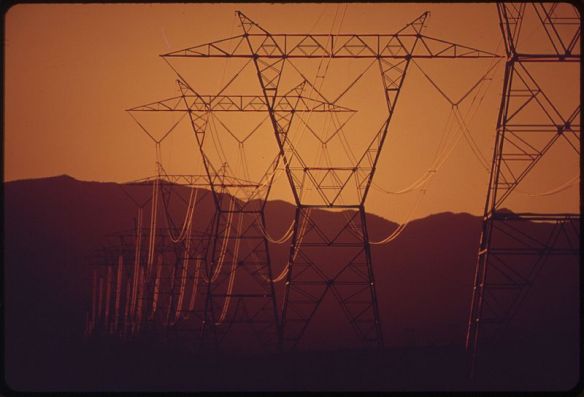On average, Germany obtained 27.8% of their electrical power from renewable sources in 2014, up from 6.2% in 2000. This contrasts with 13.2% renewably produced electricity in the US and 18% in the UK.
Writing in the October 22, 2014 Guardian , Kate Henderson, Chief Executive of the Town and Country Planning Association, attributes much of Germany’s success in greening their power supply to a growing grassroots movement to re-muncipalize power production. Since 2007, 170 German municipalities have bought back their grid from private power companies. This is in addition to 650 energy cooperatives owned by private individuals and cooperatives. Due to the innate inefficiency of power grids,* numerous communities have abandoned large regional grids for local distributed energy projects.
As Nick Rosen writes in Off the Grid, there’s no question that smaller, decentralized energy supply networks are cheaper and more efficient for consumers. Grids only developed because they’re more profitable for power companies.
I totally agree with Henderson’s premise: citizens need to quite relying on dishonest politicians and sociopathic corporations to help them reduce their dependence on fossil fuels. It makes much more sense to take back power generation into local community control.
What I find especially exciting is that it’s already happening.
Taking Back the Grid
In late 2013, the citizens of Hamburg (Germany’s second largest city) voted to buy back their electrical power grid. Two other major cities, Frankfurt and Munich, resisted privatization in the 1990s and retained their electrical supply in public hands. In 2013, Berlin voters also passed a referendum to re-muncipalize their power supply, but the voter turnout was too low for it to take effect.
Several US cities have hosted similar re-municipalization movements. In 2011 owing to Xcel Energy’s reluctance to pursue solar energy alternatives, Boulder Colorado passed two ballot initiatives empowering the city council to buy back the power grid. The process has been stalled fighting Xcel lawsuits challenging the city’s right to buy the energy grid.
The Privatization of US Energy Utilities
Until about the 1980s, most US cities had public utilities. However, the lingering effects of the 1970s energy crisis and the privatization and deregulation frenzy of the Reagan and Clinton years led many cities to sell their power plants and distribution grids in the eighties and nineties. Since that time, large energy conglomerates, most of which are hooked on coal-fired power or fracked gas, have controlled most of America’s energy production.
Santa Fe and Minneapolis are also considering initiatives to buy back their electricity supply.
Sacramento, Austin and Seattle, which never gave theirs up, are far ahead of the rest of the country in their reliance on renewable power generation.
Sacramento derives 38% of its electricity from renewable resources, Austin 20% and Seattle 93.8%.
*According to the EPA. Our current electrical power system operates at approximately 33% efficiency.
photo credit: wikimedia commons


THERE ARE SOME ANSWERS AND SOLUTIONS, BUT BOTTOM LINE THEY WANT US TO SPEND EVERY LAST PENNY WE HAVE, SO THAT THEY CAN STAY IN POWER. PEOPLE WHO HAVE EMPLOYMENT IN UTILITIES, CAN BE EMPLOYED AND TRAINED IN OTHER ENDEAVORS, MOST LIKELY EMPLOYMENT THAT THEY WOULD ENJOY MUCH BETTER, KNOWING THAT OTHERS CAN LIVE AS WELL. FOLLOW THE LINK AND THE MONEY CONCEPTS:
http://enpundit.com/glow-dark-path-provides-energy-free-alternative-street-lights/?utm_source=feedburner&utm_medium=email&utm_campaign=
LikeLike
A great article after my heart and I take this as a late Father’s day present. I can’t wait for Australia to start the revolution in taking back the Grid.
LikeLike
Same here. Our current NZ government is still so stuck in the dark ages that they’re still incrementally selling off our power companies.
LikeLike
A bit off subject but main reason why Thai government owned power grid provide low cost electricity to all of Thailand and free electricity to small user is power of rural population to be accounted
http://www.scmp.com/business/global-economy/article/1855938/thaksinomics-returns-thailand-junta-rethinks-revival
LikeLike
Good move. The US government should take a page out of their book. Extreme inequality is one of the biggest, if not the biggest, barriers to economic growth.
LikeLike
Reblogged this on An Outsider's Sojourn II and commented:
If these countries and cities in the US can get this done, why not the rest of us? We need to take back control of our individual/collective power and lives!
Anarchy! Self governing/sustaining communities!
LikeLike
Most people are totally unaware this stuff is happening. When they still had current affairs programming on TV in the 70s and 80s, it was still possible to hear about innovative policies like this.
LikeLiked by 1 person
Yes, the flow of this kind of info has been curtailed. Doesn’t fit well with the elite agenda!
LikeLike
Always chuckle when I read about the UK and “renewables”
LikeLike
Because? You’ve piqued my curiosity, Josh.
LikeLike
Pingback: Crumbling America | The Most Revolutionary Act